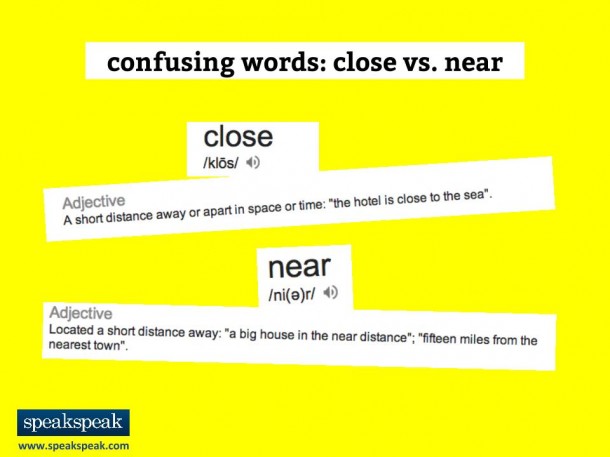
When you are talking about PHYSICAL DISTANCES, you can use either word:
- The hospital is near.
- The hospital is close.
Both these sentences are correct and mean the same thing, a SHORT DISTANCE.
NEAR and CLOSE have also this same meaning when referring to TIME:
- Summer is near.
- Summer is close.
When close has this meaning, it is pronounced /kləʊs/.
And notice that close is often followed by the preposition to:
- The hospital is close to the park.
- The hospital is near the park.
Be Careful! Don’t confuse the adjective close with the verb close /kləʊz/. If you close something, you move it so that it fills a hole or gap.
Close near
Now, when you are talking about something that deals with ABSTRACT IDEAS OR QUALITIES, like RELATIONSHIPS, you use CLOSE instead of near:
- My friend and I live in different countries, but we are very close.
Here, I am saying that my friend and I are not in the same physical area, but we are emotionally connected. We are good friends.
However, if I say, “My neighbor and I live in the same apartment building, but we are not close,” I mean we occupy the same physical area, but we are not emotionally connected. My dog tried to bite his dog once, and he has never spoken to me again!
You can refer to someone you know well as a close friend.
- Mike and I are very close friends.
- His father was a close friend of my father.
You can refer to someone who is directly related to you as a `close relative.
- She had no very close relatives.
You can also refer to someone as a `near relative, but this is less common.
You can say:
- They’re a close family.
- My dad was closer to his brother than to his sister.
Close is also used in the following collocations:
- a close encounter
The mountaineer Joe Simpson has had several close encounters with death. - a close race
After a close race, Obama won the election. - a close finish
It was a close finish – only a tenth of a second separated the two runners.
Near close
- a near miss
The asteroid passed 27,700 km from the surface of Earth – a near miss. - in the near future
The volcano could erupt in the near future, according to scientists. - in the near distance
We could see someone in the near distance.
https://grammar.collinsdictionary.com/english-usage/what-is-the-difference-between-near-and-close
